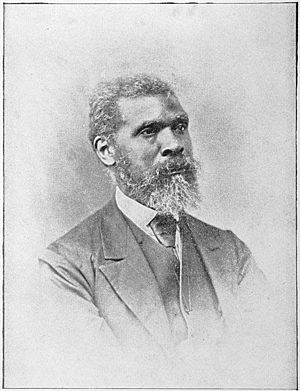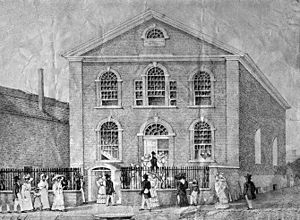John C. Bowers facts for kids
Quick facts for kids
John C. Bowers
|
|
|---|---|
 |
|
| Born | February 9, 1811 Philadelphia, Pennsylvania, US
|
| Died | October 5, 1873 (aged 62) Philadelphia, Pennsylvania, US
|
| Resting place | Eden Cemetery, Collingdale, Pennsylvania |
| Occupation | Entrepreneur, organist, vestryman |
| Organization | St. Thomas African Episcopal Church, |
| Movement | Colored Conventions Movement |
| Spouse(s) | Mary C. Collins |
| Relatives | Thomas Bowers (brother) |
John C. Bowers (born February 9, 1811 – died October 5, 1873) was an important African American leader in Philadelphia, Pennsylvania. He was a successful businessman, a talented organist, and a church leader. Bowers was also a founding member of the first Grand United Order of Odd Fellows for African Americans in Pennsylvania. He worked hard against slavery and helped start many important groups, including the Pennsylvania Anti-Slavery Society. John C. Bowers was known as a strong supporter of ending slavery and a great public speaker.
Contents
Early Life and Family
John C. Bowers was born in Philadelphia, Pennsylvania. His parents were John and Henrietta Bowers. His father, John C. Bowers, Sr., was also a leader in the community. He sold used clothes, was a church leader, and helped start the Pennsylvania Anti-Slavery Society.

Like his father, John C. Bowers was a member of the St. Thomas African Episcopal Church. He became the church's organist. John also helped his younger brother, Thomas Bowers, learn to play the piano and organ. Thomas later became a famous singer. Their sister, Sarah Sedgwick Bowers, also became a professional singer.
John C. Bowers learned to be a tailor, which is someone who makes and mends clothes. He owned a popular clothing shop in Philadelphia. His shop was known for making stylish clothes for important gentlemen and businessmen.
Community Work and Activism
John C. Bowers believed in the power of education and community. He joined several groups that focused on reading and learning.
Supporting Education and Learning
Bowers was one of the people who signed the rules for the Philadelphia Library Company of Colored Persons. This library started in 1833. Its goal was to collect useful books for its members. For a small fee, African Americans could get books and learn. The library also had weekly debates. This helped members practice speaking in public.
Even though the Library Company was for men, Bowers also supported women's education. He wrote to a newspaper in 1834, praising women's reading groups. He also helped start the Gilbert Lyceum in 1841. This group allowed both women and men to study literature and science together. In 1841, he became the secretary for The Colored American, a weekly newspaper.
Fighting for Rights
Bowers was a delegate to the first meeting of the American Moral Reform Society in 1837. There, he gave a speech about temperance, which means avoiding alcohol. This society worked for "Education, Temperance, Economy and Universal Liberty." Bowers was also part of the Association for Moral and Mental Improvement.
In 1838, Pennsylvania wanted to change its constitution to only allow white men to vote. African Americans formed a committee to fight this. John C. Bowers was on this committee. They wrote a powerful message called the "Appeal of Forty Thousand Citizens Threatened with Disenfranchisement." They hoped to convince white citizens not to approve the change. Bowers helped raise money to publish this message.
However, the new constitution was approved, and free African Americans in Pennsylvania lost their right to vote. They did not get it back until the 15th Amendment was passed in 1869. During this time, Bowers continued to work for African American voting rights.
Opposing Colonization and Supporting Soldiers
Bowers strongly disagreed with the American Colonization Society. This group wanted free black people to leave the United States and move to Liberia in Africa. Bowers believed African Americans belonged in the U.S.
He was a delegate to the Colored National Convention in 1855. In 1865, he became president of the Colored People's Union League of Philadelphia. He also joined the Pennsylvania State Equal Rights League.
During the American Civil War, Bowers encouraged black men to join the Union Army. In 1863, he presented flags to the Sixth United States Colored Troop. He spoke to them, praising their bravery in the war.
Helping the Community through Odd Fellows
Bowers cared about helping people in need. He helped create a list of aid societies for African Americans in 1831. He was a founding member of Unity Lodge No. 711. This was the first lodge of the Grand United Order of Odd Fellows for African Americans in Pennsylvania, started in 1845.
The Odd Fellows was a "friendly society" that offered help, similar to insurance. It provided money and support for members during illness, death, disability, or for widows. Bowers was active in this group for his whole life. He served as a Director many times and was even the Grand Master in 1870.
When John C. Bowers died, The Philadelphia Inquirer newspaper wrote that he was an "active and enterprising citizen." They said he was "warmly interested in all plans for the advancement of his people" and strongly against slavery. Another African American newspaper called him "one of the very best representative colored men that Philadelphia could boast of."
Personal Life and Legacy
In 1835, John C. Bowers married Mary C. Collins. She taught Sunday school at their church. Sadly, she died just one year after they were married.
John C. Bowers passed away in 1873. He was first buried in Lebanon Cemetery in Philadelphia. Later, in 1903, his remains were moved to Eden Cemetery in Collingdale. Eden Cemetery is the oldest public African American burial ground in the United States. Many people were moved there because of new construction projects in Philadelphia.
 | Selma Burke |
 | Pauline Powell Burns |
 | Frederick J. Brown |
 | Robert Blackburn |

